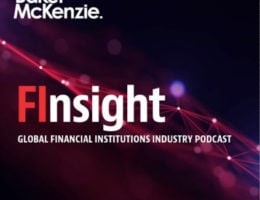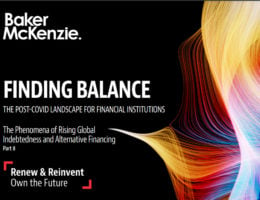Under the FTC’s order, JAB must obtain the Commission’s prior notice provision and also a broad prior approval provision. That is a risk if the PE firms have a roll-up strategy, because it then requires future notification on acquisitions in the same space. This puts the firms at a disadvantage in a competitive auction setting.
There is growing attention on private equity from antitrust regulators. In 2022, the US Federal Trade Commission placed a condition on JAB Consumer Partners’ acquisition and required prior approval and notice regarding future acquisitions in the same space. Sponsors are encouraged to be more active with legislative and regulatory engagement and behave more like large corporates.
The business models of financial institutions are changing: how services are delivered, the ways in which they can earn revenue and the search for new ways to monetize value. COVID-19 has accelerated the take-up of digital transformation due to the need to conduct more business remotely through digital channels. Simultaneously, customers have shown a greater willingness to use technologies in which previously they may have lacked confidence.
Read our ninth installment focused on the impact of new technology on financial institutions.
Episode 21: COP26 Key Takeaways for Sovereign Wealth Funds
In this episode of FInsight, Andrew Hedges and Kay She from Baker McKenzie’s EMI group in London discuss their experience and observations while on the ground in Glasgow. They cover business imperatives and challenges affecting the global economy and how sovereign wealth funds are well-positioned to influence and make an impact on broader sustainability goals and action plans. As discussions on climate-related issues evolve from commitments to execution in the recent COP26 UN Climate Change Conference, we unpack some of the key takeaways relevant for sovereign wealth funds.
The risks arising from unsustainable indebtedness to which both traditional and alternative financing sectors have exposure are higher in emerging economies, where the debt burden is much more elevated generally and whose borrowers are more susceptible to default if (as is expected), US dollar interest rates rise. Emerging economies with less policy intervention, monitoring and regulation are more vulnerable than advanced economies. This eighth installment focuses on the phenomena of rising global indebtedness and alternative financing.
In this episode of FInsight, Baker McKenzie partners Daniela Fonseca Puggina from our Miami office and Jennifer Semko from our Washington D.C. office discuss litigation readiness for FIs. The episode also covers potential vulnerabilities and disputes that they need to prepare for, current and emerging trends in litigation (from our Litigation Intelligence Tool and Report), and how they can benefit from litigation preparedness.
In the latest episode of the Global Financial Industry Podcast, Baker McKenzie associates discuss: Sovereigns series – key principles of investment treaty protection. The episode covers recent examples of sovereign wealth fundsSWFs bringing investment treaty claims and how others can obtain access to these protections. The episode also analyzes why investors should consider investment treaties as part of their decision-making process.
Partners Michael Fieweger and Derek Liu were featured in Private Equity International’s Keynote Interview, entitled “Public deals for private equity”.
In this interview Michael and Derek discuss reasons why SPACs present an attractive opportunity for Private Equity investors, but they consider the potential challenges for mid-market PE funds and potential conflicts they can create for private equity firms. They also give their opinion on the reasons for the decline in PIPEs and provide forecasts for how the SPAC market will evolve into 2022.
COVID-19 represents one of the greatest ever shocks to our economies and, in consequence, to the business models of financial institutions and the way they do business. While many changes to business processes and operations were already taking place prior to the pandemic, COVID-19 has given many added impetus and urgency. Decision-makers must choose between adapting a wait-and-see approach or implementing more proactive strategies to safeguard and, if possible, grow their businesses.
In this special edition, Eva-Maria Segur Cabanac, a partner in our Vienna office and global sustainability lead for financial institutions, and Jennifer Klass, a partner in our New York office and co-chair of the financial regulation and enforcement practice in North America, talk with Ying Yi Liew on how the COVID-19 pandemic led to the prioritization of Environmental, Social, and Governance (ESG) considerations among financial institutions (FIs).









